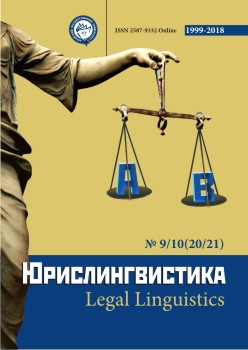ANTI-CORRUPTION EXPERTISE OF MUNICIPAL REGULATORY LEGAL ACTS: STATUS AND SEARCH OF OPTIMAL SOLUTIONS
Abstract
The article is devoted to the analysis of the current state of the institution of anti-corruption expertise of municipal legal acts and their drafts in the Russian Federation. Anti-corruption expertise is one of the strands of the state anti-corruption policy. A legal basis for conducting anti-corruption expertise has been formed in Russia within a relatively short period of time, however there are some shortcomings in the legal regulation of anti-corruption expertise of municipal regulatory legal acts and their drafts, which causes problems in its implementation. Unfortunately, it should be recognized that the legislator does not pay due attention to the issues of combating corruption at the municipal level. The Basic Federal Law of October 6, 2003 No. 131-FZ “On the General Principles of the Organization of Local Government in the Russian Federation” contains only a small number of rules regulating anti-corruption activities and only regarding the issues of local importance in of all types of municipalities. The Federal Law of July 3, 2009 No. 172-ФЗ “On anti-corruption expertise of regulatory legal acts and draft regulatory legal acts” contains legal and organizational bases of anti-corruption expertise of normative legal acts and draft normative legal acts in order to identify corruption-related factors and their subsequent elimination, The implementation of the norms of the given law raises more questions than answers. Thus, for example, a question arises if authorities of the constituent entities of the Russian Federation have legal power to conduct anti-corruption expertise of municipal regulatory legal acts, since the law doesn’t mention them as its subjects.
As a result of the analysis of the existing legal framework and law enforcement practice, the author identifies the shortcomings existing in the institute of anti-corruption expertise, identifies their main causes and suggests ways to solve them.
Downloads
References
Аблиев Т. М. Теоретические проблемы антикоррупционной экспертизы муниципальных нормативных правовых актов и проектов муниципальных нормативных правовых актов // Теория и практика общественного развития. 2017. № 6. С. 123-130.
Балдин А. К. Антикоррупционная экспертиза нормативных правовых актов как инструмент познания правовой материи в системе юридических экспертиз
// Современное право. 2014. № 2. С. 46-49.
Братановский С. Н., Зеленов М. Ф. Сущность антикоррупционной экспертизы как вида правовой экспертизы // Вестник Сибирской академии права, экономики и управления. 2012. № 1 (5). С. 20-23.
Дымберова Э. Д. Антикоррупционная экспертиза муниципальных нормативных правовых актов: состояние и поиск путей совершенствования // Журнал российского права. 2014. № 9 (213). С.62 – 68.
Казанцева О. Л. Проблемы правотворческой деятельности муниципальных образований в Российской Федерации // Вестник Новосибирского государственного университета. Серия «Право». 2013. Т. 9. № 2. С. 69–74.
Коррупция: природа, проявления, противодействие / Отв. ред. Т.Я. Хабриева. М., 2012.
Муртазина Г. М. Антикоррупционная экспертиза муниципальных нормативных правовых актов как мера борьбы с коррупцией // Актуальные проблемы экономики и права. 2010. № 1 (13). С. 155-160.
Николаева Д. В., Паулов П. А. Проблемы нормотворчества органов местного самоуправления // Современные научные исследования и разработки. 2018. № 1 (18). С. 277-279.
Петренко А. В. Антикоррупционная экспертиза в Российской Федерации как вид правовой экспертизы // Наука и образование: хозяйство и экономика; предпринимательство; право и управление. 2011.№ 2 (8). С. 85-87.
Родионова О. Н. Антикоррупционная экспертиза // Российский юридический журнал. 2010. № 1. С. 158-162.
REFERENCES
Abliyev T. M. Teoreticheskiye problemy antikorruptsionnoy ekspertizy munitsipal'nykh normativnykh pravovykh aktov i proyektov munitsipal'nykh normativnykh pravovykh aktov // Teoriya i praktika obshchestvennogo razvitiya. 2017. № 6. S. 123-130.
Baldin A. K. Antikorruptsionnaya ekspertiza normativnykh pravovykh aktov kak instrument // Sovremennoye pravo. 2014. № 2. S. 46-49.
Bratanovskiy S. N., Zelenov M. F. Sushchnost' antikorruptsionnoy ekspertizy kak vid pravovoy ekspertizy // Vestnik Sibirskoy akademii prava, ekonomiki i upravleniya. 2012. № 1 (5). S. 20-23.
Dymberova E. D. Antikorruptsionnaya ekspertiza munitsipal'nykh normativnykh pravovykh aktov: sostoyaniye i poisk putey sovershenstvovaniya // Zhurnal rossiyskogo prava. 2014. № 9 (213). S.62 - 68.
Kazantseva O. L. Problemy pravotvorcheskoy deyatel'nosti munitsipal'nykh obrazovaniy v Rossiyskoy Federatsii // Vestnik Novosibirskogo gosudarstvennogo universiteta. Seriya «Pravo». 2013. T. 9. № 2. S. 69-74.
Korruptsiya: priroda, proyavleniya, protivodeystviye / Otv. red. T.YA. Khabriyevo. M., 2012.
Murtazina G. M. Antikorruptsionnaya ekspertiza munitsipal'nykh normativnykh pravovykh aktov kak mera bor'by s korruptsiyey // Aktual'nyye problemy ekonomiki i prava. 2010. № 1 (13). S. 155-160.
Nikolayeva D. V., Paulov P. A. Problemy normotvorchestva organov mestnogo samoupravleniya // Sovremennyye nauchnyye issledovaniya i razrabotki. 2018. № 1 (18). S. 277-279.
Petrenko A. V. Antikorruptsionnaya ekspertiza v Rossiyskoy Federatsii kak vid pravovoy ekspertizy // ekonomika i ekonomika; predprinimatel'stvo; pravo i upravleniye. 2011.№ 2 (8). S. 85-87.
Rodionova O. N. Antikorruptsionnaya ekspertiza // Rossiyskiy yuridicheskiy zhurnal. 2010. № 1. S. 158-162.
Copyright (c) 2019 Олеся Леонидовна Казанцева

This work is licensed under a Creative Commons Attribution 4.0 International License.
The authors, which are published in this journal, agree to the following conditions:
1. Authors retain the copyright to the work and transfer to the journal the right of the first publication along with the work, at the same time licensing it under the terms of the Creative Commons Attribution License, which allows others to distribute this work with the obligatory indication of the authorship of this work and a link to the original publication in this journal .
2. The authors retain the right to enter into separate, additional contractual agreements for the non-exclusive distribution of the version of the work published by this journal (for example, to place it in the university depository or to publish it in a book), with reference to the original publication in this journal.
3. Authors are allowed to post their work on the Internet (for example, in a university repository or on their personal website) before and during the review process of this journal, as this may lead to a productive discussion, as well as more links to this published work (See The Effect of Open Access).










